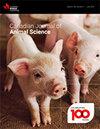影响魁北克奶牛场牛奶脂肪酸组成和淀粉样蛋白 A 浓度的动物和牧场因素
IF 1.2
4区 农林科学
Q3 AGRICULTURE, DAIRY & ANIMAL SCIENCE
引用次数: 0
摘要
采用多元回归法测定了魁北克 24 个牧场 336 头荷斯坦奶牛的牧场和动物因素与牛奶中脂肪酸 (FA) 含量和牛奶淀粉样蛋白 A (MAA) 含量之间的关系。体细胞数(SCC)超过 20 万的奶牛和饲喂棕榈油的牧场被排除在外。回归模型的独立因素包括产奶天数(DIM)、胎次、产量、牛奶中的脂肪和蛋白质含量、SCC 以及日粮中的中性洗涤纤维(NDF)和粗脂肪(CFAT)含量。逐步删除了 P 值大于 0.25 的非重要变量。拟合度较高的模型是总短链脂肪酸、中链脂肪酸、奇数和支链脂肪酸(OBCFA)以及饱和长链脂肪酸模型,R2 分别为 0.33、0.36、0.34 和 0.41。牛奶中的脂肪和蛋白质含量以及产量并不影响牛奶的脂肪酸组成。较高的 NDF 增加了乳脂中短链脂肪酸和 OBCFA 的比例,降低了单不饱和脂肪酸 (MUFA) 和多不饱和脂肪酸 (PUFA) 的比例。较高的 CFAT 会降低短链脂肪酸的比例,但会增加 MUFA 和 PUFA 的比例。增加 DIM 会降低短链脂肪酸的比例,增加中链脂肪酸的比例。较高的 SCC 会增加 MAA。本文章由计算机程序翻译,如有差异,请以英文原文为准。
Animal and Farm Factors Affecting the Fatty Acid Profile and Amyloid A Concentration of Milk on Quebec Dairy Farms
Relationships between farm and animal factors and the fatty acid (FA) profile and milk amyloid A (MAA) content of milk were determined in 336 Holstein dairy cows on 24 Quebec farms using multiple regression. Cows with a somatic cell count (SCC) above 200,000, and farms feeding palm oil were excluded. Independent factors of the regression models included days in milk (DIM), parity, yield, fat and protein contents of milk, SCC, and the dietary contents of neutral detergent fibre (NDF) and crude fat (CFAT). Non- significant variables with P-values >0.25 were stepwise removed. Models with high fits were those of total short chain FA, medium chain FA, odd- and branched-chain FA (OBCFA), and saturated long chain FA with R2 of 0.33, 0.36, 0.34, and 0.41, respectively. The fat and protein contents and yield of milk did not affect the milk FA profile. Higher NDF increased the milk fat proportions of short chain FA and OBCFA and decreased those of monounsaturated (MUFA) and polyunsaturated FA (PUFA). Higher CFAT reduced this proportion of short chain FA but increased those of MUFA and PUFA. Increasing DIM reduced this proportion of short chain FA and increased that of medium chain FA. Higher SCC increased MAA.
求助全文
通过发布文献求助,成功后即可免费获取论文全文。
去求助
来源期刊

Canadian Journal of Animal Science
农林科学-奶制品与动物科学
CiteScore
2.30
自引率
0.00%
发文量
51
审稿时长
6 months
期刊介绍:
Published since 1957, this quarterly journal contains new research on all aspects of animal agriculture and animal products, including breeding and genetics; cellular and molecular biology; growth and development; meat science; modelling animal systems; physiology and endocrinology; ruminant nutrition; non-ruminant nutrition; and welfare, behaviour, and management. It also publishes reviews, letters to the editor, abstracts of technical papers presented at the annual meeting of the Canadian Society of Animal Science, and occasionally conference proceedings.
 求助内容:
求助内容: 应助结果提醒方式:
应助结果提醒方式:


